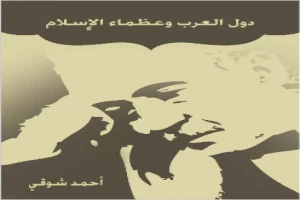Newly released
This book is new and will be uploaded as soon as it becomes available to us and if we secure the necessary publishing rights.

دُوَلُ العَـرب وعُظَماء الإسلامِ Book PDF
(0)
Author:
Ahmad ShawqiNumber Of Reads:
43
Language:
Arabic
Category:
HistorySection:
Pages:
110
Quality:
good
Views:
934
Quate
Review
Save
Share
Book Description
Ahmad Shawqi
Ahmed Shawky: An Egyptian poet, considered one of the greatest Arab poets in various eras. Writers and poets of his time pledged allegiance to him over the emirate of poetry, so he was called the “Prince of Poets”. He had a unique poetic talent, and a fluid pen. He did not find any trouble in composing poetry, as meanings always flowed to him like a flowing river. That is why he was one of the most fertile Arab poets, and his poetic output reached what almost no ancient or modern Arab poet had reached him, as the number of verses of his poetry exceeded twenty-three thousand and five hundred. Ahmed Shawqi Ali was born in the Hanafi district of Cairo in 1868 AD, to a Circassian father and a mother of Greek origins, but he was raised and raised by his maternal grandmother who worked as a maid in the Khedive Ismail Palace. Shawqi, at the age of four, entered the book, where he memorized a portion of the Qur’an, and then moved to complete his primary education. The boy showed a fondness for poetry in his childhood, which made him dedicate himself to poets’ collections, so he memorized and extracted from it as much as he could. When he completed fifteen years of age, he joined the translation department, which Recently established at the School of Law, he then traveled to France to complete his legal studies, and despite his presence in Paris at the time, he showed only a limited influence on French culture, as he was not impressed by French poets such as: Rimbaud, Baudelaire, and Verlaine. His heart remained attached to the Arab poets, on top of them Al-Mutanabbi. Ahmed Shawky is considered one of the founders of the School of Revival and Resurrection of Poetry, along with: Mahmoud Sami Al-Baroudi, Hafez Ibrahim, Ali Al-Jarm, and Ahmed Muharram. The poets of this school adhered to the systems of Arabic poetry according to the approach of the ancients, especially the period between the pre-Islamic and Abbasid eras. Shawqi organized poetry with all its purposes: praise, lamentation, flirtation, description, and wisdom. Writers and poets pledged allegiance to Ahmed Shawky as their emir in a ceremony held in Cairo in 1927 AD, and the man remained admired and appreciated not only among the elite among the intellectuals and writers, but from the general public as well. general.
Book Currently Unavailable
This book is currently unavailable for publication. We obtained it under a Creative Commons license, but the author or publisher has not granted permission to publish it.
Rate Now
5 Stars
4 Stars
3 Stars
2 Stars
1 Stars
دُوَلُ العَـرب وعُظَماء الإسلامِ Quotes
Top Rated
Latest
Quate
Be the first to leave a quote and earn 10 points
instead of 3
Comments
Be the first to leave a comment and earn 5 points
instead of 3